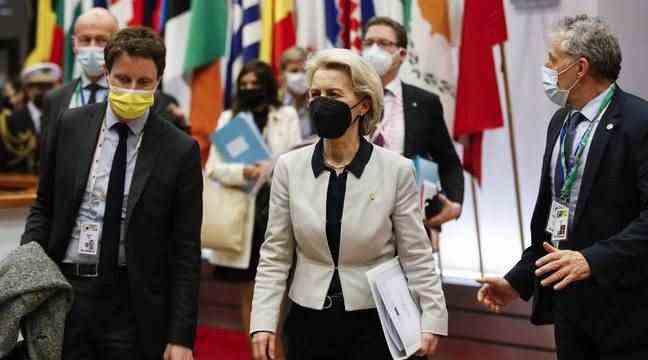The Kremlin had been warned before attacking Ukraine, so many countries have since Thursday carried out their threats of sanctions. These are mainly economic and target the banks or the circles around Vladimir Putin.
The European Union, meeting at a summit in Brussels, announced Thursday evening to toughen its sanctions against Russia in the energy, finance and transport sectors. However, the 27 have not yet excluded Moscow from the Swift banking network, which allows payments to be received or sent worldwide.
Belarus also targeted
The objective is in particular to drastically limit Russia’s access to European capital markets. The EU will also reduce Russians’ access to “crucial technologies”, depriving them of electronic components and software. According to a draft text, it would notably include a ban on exporting planes, parts and equipment from the aeronautics and space industry to Russia, as well as refining technologies for the oil industry.
Finally, new sanctions would strike individuals in the circles of power (freezing of assets, prohibition of European territory, etc.). Belarus, accused of being involved in Russian operations, will also be hit with additional sanctions.
US President Joe Biden also announced on the same day a series of new sanctions targeting Russian banks, elites and exports. Four additional Russian banks, including the country’s two largest, Sberbank and VTB Bank, will be sanctioned and more than half of Russia’s technology imports cut, he said in a speech from the House. White. Energy giant Gazprom and 13 other big companies in the country will no longer be able to raise money in Western financial markets, a sanction that had already been taken against the Russian government itself.
The United States has also extended the list of penalized Russian oligarchs and restricted exports to Russia of technological products intended for the defense and aeronautics sectors. Washington also announced sanctions against 24 Belarusian individuals and organizations.
Aeroflot’s private planes from United Kingdom
Also on Thursday, the UK imposed a new round of sanctions on Russia, banning airline Aeroflot from serving the UK and targeting the banking sector, tech exports and five businessmen. In addition to five banks already sanctioned on Tuesday, the Russian public banking giant VTB is targeted and sees its assets on British soil frozen. More generally, the new measures “will allow us to completely exclude Russian banks from the British financial sector,” said Boris Johnson. They will also prevent public and private companies from raising funds in the UK and limit the sums Russians can hold in their UK bank accounts.
Japan for its part announced on Friday additional sanctions against Moscow, targeting the financial sector and the export of electronic components. These “include the freezing of assets and the suspension of the issuance of visas to Russian individuals and organizations,” the prime minister said. Fumio Kishida also announced further measures “on exports to Russian organizations linked to the military” and on “general purpose goods like semiconductors and items on a restricted list based on international agreements”. .
Wagner mercenaries targeted by Ottawa
Moscow is also in Canada’s sights. Ottawa will sanction “58 Russian individuals and entities”, announced Prime Minister Justin Trudeau. Ministers are precisely targeted: those of Defense, Finance and Justice, as well as the group of Russian mercenaries Wagner, reputed to be close to Vladimir Putin. Canada has also suspended export permits for Russia, worth more than 700 million Canadian dollars (487 million euros) and targeting in particular companies in the aerospace, mining and information technology sectors.
Finally in Australia, Prime Minister Scott Morrison announced Thursday a “second series” of sanctions against four financial institutions and 25 people belonging to four entities in charge of the development and sale of military equipment. He said further rounds of sanctions, including against more than 300 Duma members who voted for the “illegal invasion of Ukraine”, will be imposed “as we identify the responsible”.
Switzerland, on the other hand, has decided not to align itself with Western sanctions against Russia. However, it will take the necessary measures to avoid being used as a bypass base by Moscow, declared its president Ignazio Cassis.

